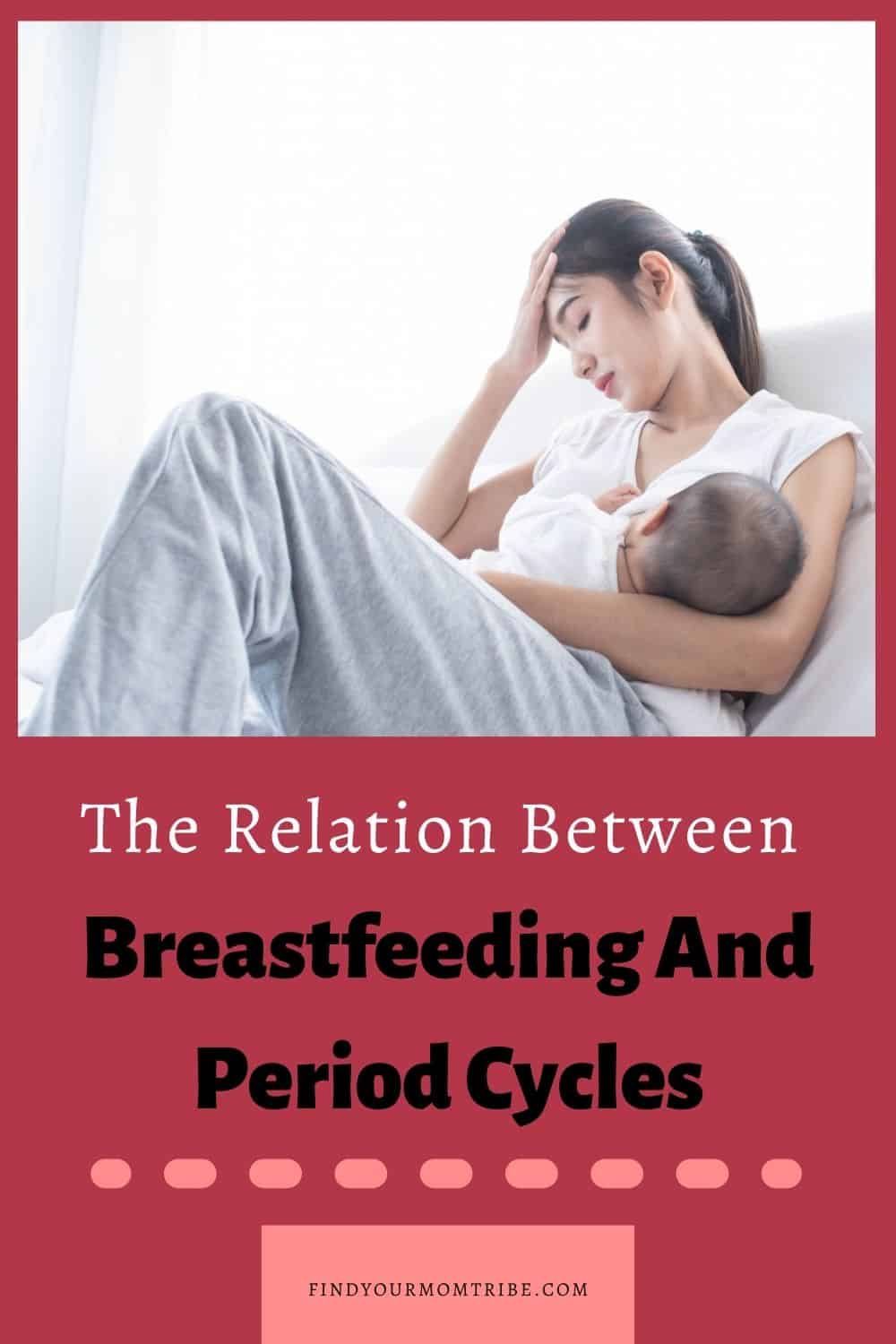When finding the relation between breastfeeding and period cycles, many women often get confused.
That’s because breastfeeding is known to delay periods, but that isn’t necessarily a bad thing.
For, you see, when you finally deliver your little one into the world, your hormones shift from pregnancy support to newborn support.
This is where the hormone prolactin comes in and helps stimulate breast milk production.
But what you might not have known is that it also stifles your menstrual period so your body can further recover before reaching fertility again.
This phase usually ends after about 3 months postpartum, which is roughly when you can expect your first postpartum period to occur.
Of course, that’s not always the case, as every woman’s body is different in its own right.

The return of your period can come earlier than most women (after around 6 weeks after delivery) or it can take up to 9 whole months before you experience one again.
All of it is perfectly expected, though if you’re worried, you are free to consult with your doctor if you think there’s something awry.
That said, the heavy bleeding that you’re going to experience right after childbirth is not a menses, it’s an excretion called lochia and is what was lining your uterus as your baby was growing inside your womb.
The body is expelling it to get your uterus started on the recovery process for potential future pregnancies; the menstrual cycle comes after.
So don’t confuse the two, even though lochia and menses do seem rather alike in appearance.
But, does our period affect our breast milk in any way or cause any breastfeeding problems? Well, that’s what I’m here to explain today.
The Effects That Breastfeeding And Periods Have On Each Other

Menstruation is the sign of a healthy and fertile body. In the stage after your delivery, your body isn’t quite in that peak form to start another pregnancy up.
This is why the menstrual cycle gets paused while the body recovers and while you’re nursing your newborn child.
It’s all thanks to the hormonal changes happening within your body that these interactions between your breastfeeding and period cycles happen in the first place.
As mentioned prior, prolactin engages the production of breast milk in breastfeeding moms and helps them not have to worry about that time of the month while providing all of the necessary nutrients to their little ones.
Breastfeeding mothers who practice exclusive breastfeeding are in the group that’s going to get their menstrual cycle operational at a later date, when the body is certain that the child has received enough nourishment.
In a way, making one’s body ovulate later due to breastfeeding makes it an odd form of birth control,
a natural one at that that doesn’t have you taking medication that may interact poorly with your body or milk supply.
Speaking of milk supply interactions, should you see your period return while still nursing your child, do expect a few things to happen.
During the pregnancy itself and the first year or two after birth, major hormone changes and shifts in hormone levels are what dictate what our body is going to be doing at a given time, and in this case it’s no different.
Your first period post-delivery and any subsequent ones that happen before your child swaps to consuming solid foods are going to have an impact on three aspects of breastfeeding.
1. Your Overall Milk Supply

A reduction in milk supply happens because of the period itself, and that only occurs if there’s a lack of prolactin in your body, causing your mammary glands to produce less milk than normal.
Why the hormone itself is not present / not being produced, who knows.
It could be because you may not be taking proper care of yourself and eating a balanced enough diet, or you’re far enough into your postpartum period that there’s not that big of a need for an increased production of breast milk.
If it comes along too early, you may have an issue on your hands that may be affecting you on a small scale, but it’s definitely rather impactful for your child.
This is because he’s going to be receiving less nutrition from your breasts, which can lead to a number of developmental problems.
Should you spot this issue, immediately schedule an appointment with your lactation consultant (IBCLC) and ask them to help diagnose the issue and guide you through the proper steps of increasing your milk supply back to where it should be.
2. The Flavor Composition Of The Milk

The issue with the flavor itself is that during your ovulation period, your milk turns somewhat saltier as the levels of sodium chloride go up, while the potassium and lactose levels start going down.
This leads to a change in flavor that might also resonate poorly with your little one if he’s a picky eater.
It’s only natural to see your baby want to breastfeed a lot less for the duration of your menstrual cycle as the taste simply might not sit all that well with him.
If it’s still too early to use formula or you want to keep your child exclusively on breast milk, then I’d suggest working in a few extra pumping sessions prior to your next menstrual cycle.
This way you ensure you have some sweet liquid gold in reserve if your little one starts getting fussy.
3. The Texture Of Your Breasts

The final problem comes with the increase in estrogen and progesterone levels in your body, which leaves your breast feeling almost like you’re suffering from breast engorgement, but not really.
They start feeling full and tender, making it uncomfortable to walk around or even breastfeed if the discomfort becomes too great.
This, on top of the usual cramping that comes packaged along with one’s period, can make it feel like an almost crippling experience.
If you’re one of the unlucky ones, I’d suggest just staying as put as you can for the time being to not compromise yourself any further and focus on powering through it.
The best go-to option is getting some over-the-counter pain medication like ibuprofen to help deal with the discomfort you’re experiencing.
But, do keep in mind that anything you put into your body at this point may affect your milk production levels and the composition of your breast milk in general.
This is why you should seek out advice from your lactation consultant, doctor, or any other qualified healthcare provider to see if that’s a wise enough route to take, as it varies based on the age of your baby.
Otherwise, it’s best to simply try your best to get through it as painlessly as you can while still performing your mothering duties.
For all of you mammas out there who may find it too tough to keep your child suckling on your breast, you may want to get yourself a breast pump.
Pump milk out and feed it to your baby through a bottle to better control breast interaction during said period while also keeping your little one well fed.
The importance of breastfeeding or pumping isn’t just for the baby though, it also relates to you.
While this initial tenderness may not be a sign of breast engorgement just yet, if your feedings turn irregular because of it, it may just turn into that or even a nasty case of mastitis or clogged milk ducts because they weren’t emptied out on a regular basis.
A Warning: Don’t Start Further Family Planning Just Because Your Period Is Back

After delivery, your body turns from pregnancy mode to recovery and maternity mode, allowing the womb to heal back up to a properly functional state in which it can start growing yet another bundle of joy should the need arise.
The point at which a mother’s body becomes fertile again is signified by her first period postpartum – that much is true – BUT just because the womb is fertile again doesn’t mean that the mother’s body is ready quite just yet.
During the entire pregnancy, and especially the very act of delivering a baby to this world, your body goes through an awful lot of stress and pain.
The stress and pain that are heavily numbed through the production of the hormone oxytocin, which helps keep the body from suffering any lasting damage.
But, just because there is no damage doesn’t mean that there wasn’t a lot of strain.
Strain, that, if repeated, could lead to severe complications or a potentially lethal outcome for both you and your newly planned baby if you don’t let the body rest well enough.
The proper time frame is at least a year after your last delivery, but many doctors will suggest waiting two just to be sure.
This goes doubly so for mothers who have any potential health issues of their own. There is no need to rush, after all. Nobody is forcing you to be a baby factory but yourself.
Take a step back; give your current child the love and attention that he deserves before trying for another one.
Both your little one and your own body will thank you for it.
If you’re really insistent on consummating the love between you and your marriage partner during this waiting stage, make sure to use some of the numerous birth control options on the market that aren’t pills (preservatives and IUDs mainly).
What To Do If You’re Getting Irregular Periods

Upon the return of their menstrual cycles, a number of women experience irregular periods.
It’s a rather common occurrence postpartum and may take some time to return to your proper cycle.
Doctors suggest it can take anywhere from half a year to a whole two years before you get back into the usual 28-day cycle, which may make keeping your menstrual calendar a nightmare for the purposes of avoiding salty milk.
That said, there are cases where an irregular period may be a sign of something else plaguing your lower regions.
Most likely an infection, but you should always get it checked with your gynecologist or doctor in case you notice anything out of the ordinary, namely symptoms like:
• Blood that’s different in color
• Heavier than normal bleeding
• Mucus in the blood
• Unusually long menstrual cycles
• Frequent spotting outside of ovulation periods
• Sharp pain
All of these can be signs of things like various inflammations of your pelvic region, ovarian cysts, or uterine fibroids, which would definitely require medical attention and proper treatment to not risk further complications.
How The Return Of Your Period Affects Your Baby

While concern for herself is somewhere near the top of the priority list, almost every mom will first ask: But how does this affect my baby?
It’s a natural instinct to do so.
As mentioned a bit before, the main issue your baby is going to have with you getting your period back is the change in flavor of his favorite and primary food for a few days each month, which is not something many babies take lightly.
Sure, if you’re lucky, your little one won’t be bothered by it and everything will go along as normal, but many kids are sensitive to any change and anything that breaks the norm is likely to make them fussy and cry out in protest.
If there’s no other way of going around it and you’re not one to resort to formula, try the aforementioned strategy of making sure to keep some regular breast milk stored in your freezer to prevent from upsetting your little one.
Other than that, only the tenderness of your breasts matters, and only if it’s such an issue that you can’t breastfeed your child directly.
This, again, plays into the problem of breaking routine, which might make your little one cry, but if you have a good enough baby bottle or pacifier that properly mimics the feeling of a mother’s nipple, you should be able to overcome the issue with little to no problems whatsoever.
The Bottom Line

The connection between breastfeeding and periods can seem weird at first, but it all boils down to a bunch of hormone levels shifting around wildly, causing all sorts of different changes that may or may not present problems for moms.
Luckily, most of these problems have workarounds that are easy enough to implement, so we mammas can maintain a regular mothering lifestyle with little issue, as long as we’re diligent enough to pay attention to our menstrual calendars.
And, if you’re a mom who’s planning a big family and you’re already eager to have another baby, remember that the return of your period doesn’t necessarily mean that your body is ready to go through another pregnancy just yet.
Be patient and wait a bit longer, and you’ll be greatly rewarded with another precious bundle of joy down the line.
And, should you encounter any irregularities with your returning period, make sure to immediately seek advice from your lactation consultant or any other healthcare provider who can properly diagnose and help you treat the potential issue at hand.
References:
Jackson E, Glasier A. “Return of ovulation and menses in postpartum nonlactating women: a systematic review”. Obstet Gynecol. 2011;117(3):657-62.
Dullo P, Vedi N. “Changes in serum calcium, magnesium and inorganic phosphorus levels during different phases of the menstrual cycle”. J Hum Reprod Sci.
Like this post? Please share or pin it for later. You can also stay in the loop and follow us on Facebook, Instagram and Pinterest.

This post contains affiliate links. Please see our full disclosure for more info.

